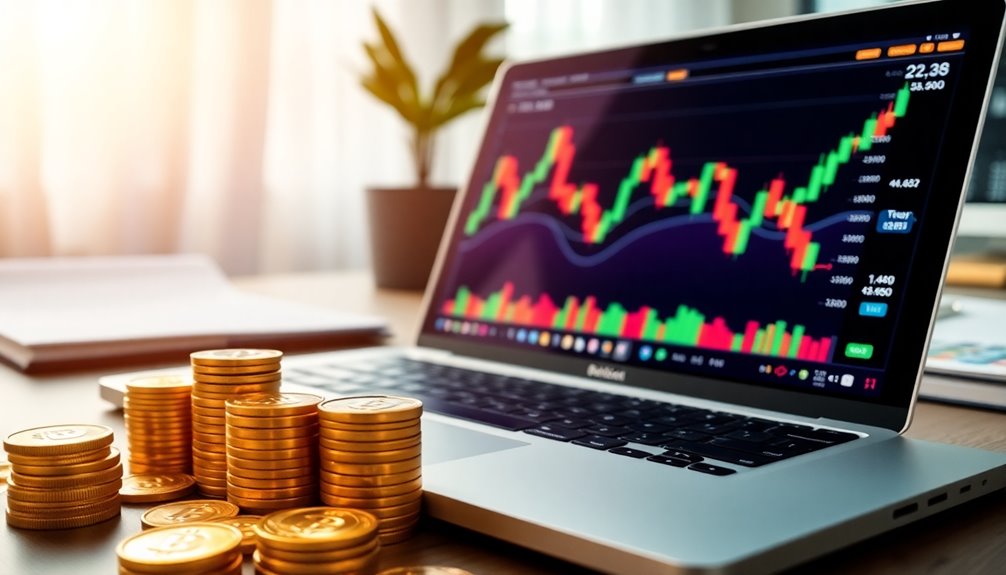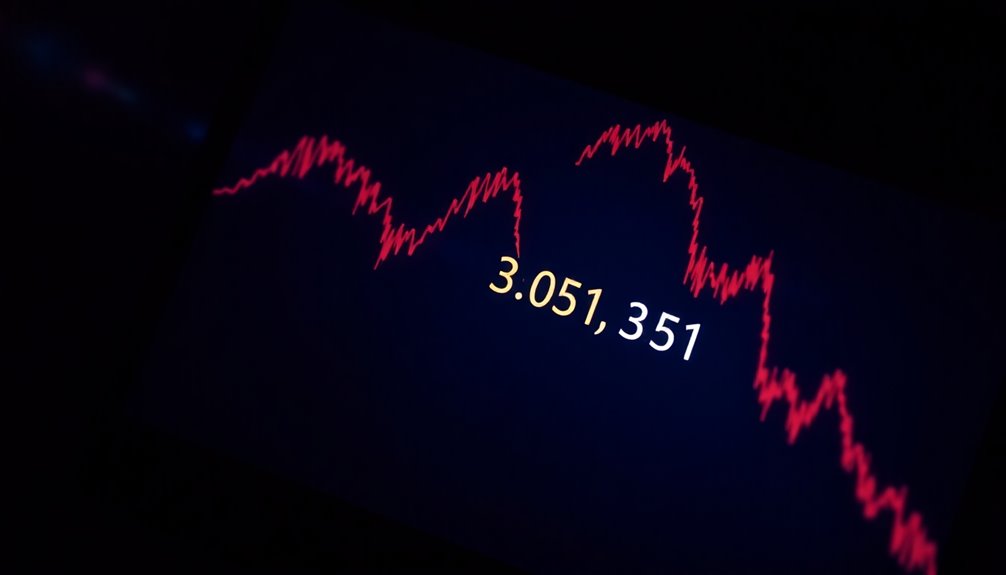Carry trades in digital assets allow you to take advantage of interest rate differentials. You can borrow in low-interest stablecoins like USDT and invest in high-yield crypto opportunities. This strategy enhances market liquidity but comes with significant risks, especially due to volatility. A sudden market shift can lead to rapid unwinding of your positions, increasing the chance of liquidations. Understanding these dynamics is crucial for success. As you explore further, you'll uncover additional insights about measuring carry trade profitability and the latest regulatory considerations in this evolving space.
Key Takeaways
- Carry trade in digital assets involves borrowing low-interest stablecoins to invest in high-yield opportunities within the crypto market.
- Profit arises from the interest rate differential between borrowing costs and investment returns, enhancing overall liquidity.
- Risks include high volatility, potential liquidations, and market shifts that can rapidly unwind trades, leading to instability.
- Measurement of carry trades requires meticulous data collection, including spot prices, futures, and options analysis across exchanges.
- Regulatory oversight is essential, with firms needing to report carry trade activities while maintaining confidentiality to ensure market integrity.
Definition and Mechanism

Carry trade in digital assets is a strategy that lets you capitalize on interest rate differentials between borrowed and invested assets.
You start by borrowing in a low-interest-rate currency or stablecoin, then invest those funds in higher-yielding opportunities, like cryptocurrencies or DeFi projects. The goal is to profit from the difference between your low borrowing rate and the returns from your investments.
You can also use leverage and yield farming to amplify your returns, though that increases your risk. By understanding the mechanics, you can navigate this landscape effectively, but be aware of the potential volatility and risks involved. This strategy requires an understanding of market conditions to identify the best opportunities.
Ultimately, mastering the carry trade can lead to significant financial opportunities in the digital asset space.
Market Dynamics

Carry trades enhance liquidity, attracting more investors and facilitating transactions. By borrowing in low-interest currencies and investing in higher-yield assets, you can drive prices upward, creating a self-reinforcing cycle that amplifies market momentum. This process significantly enhances market liquidity through the usage of stablecoins, which play a crucial role in providing liquidity to DeFi platforms.
As prices rise, more traders enter the market, increasing profitability. However, be cautious: sudden market shifts can trigger rapid unwinding of these trades, leading to liquidity issues and steep price declines. Speculative bubbles may form as more participants drive prices higher, but the risk of sharp crashes looms when trades unwind. Staying aware of these dynamics can help you navigate the complexities of the carry trade landscape.
Risks and Volatility

While engaging in carry trades, you must recognize the inherent risks and volatility that come with this strategy.
The potential for liquidations is significant, especially due to margin frictions and sudden market shifts. A mere 10% increase in carry could lead to a staggering 44% rise in liquidations of short futures positions.
This volatility is amplified by forced liquidations, which can trigger sharp price declines. Additionally, futures prices are about ten times more volatile than spot prices, creating a vicious cycle that can worsen market instability. Furthermore, the collapse of the Terra/Luna ecosystem highlighted the potential dangers of over-leveraging in carry trades.
As you navigate these trades, be aware that high carry can foreshadow future crashes and drawdowns, making it crucial to manage your risk effectively in this unpredictable landscape.
Application in Crypto Markets

As you explore the application of carry trades in crypto markets, you'll find that these strategies harness the potential of borrowing stablecoins to invest in high-yield opportunities.
By exchanging low-interest stablecoins like USDT or DAI for higher-yield investments in DeFi protocols or crypto savings accounts, you can capitalize on interest rate differentials. This approach not only increases liquidity in the market but also attracts more traders, driving prices upward. Both retail and institutional investors can leverage these strategies, tapping into a wider array of assets. With innovations like yield-bearing tokens and advanced risk management tools, the landscape of crypto carry trades continues to evolve, offering greater flexibility and potential returns compared to traditional methods. Furthermore, the current low-interest rate landscape enhances the attractiveness of these carry trades as investors seek better yields.
Measurement and Regulation

Measuring carry trades in digital assets requires meticulous data collection and analysis, given the unique characteristics of the crypto market. You'll gather daily data on BTC and ETH spot prices, futures, and options, primarily from providers like 'Skew'. The futures basis, calculated as the difference between spot and futures prices, helps assess profitability. Keep in mind that carry data varies across exchanges, with correlations typically exceeding 90%. Proxies like futures positions and trading volume help identify carry trade activity, even when detailed data is limited. Additionally, the influence of uncovered interest rate parity (UIP) on carry returns is an important consideration in the digital asset space. Regulatory oversight necessitates reporting by firms, but confidentiality must be maintained. Expanding reporting requirements and increasing survey frequency can enhance insights into carry trade dynamics, providing a clearer picture of this evolving market.
Frequently Asked Questions
What Are the Best Platforms for Executing Carry Trades in Crypto?
When you're looking to execute carry trades in crypto, consider platforms like Binance and Bybit.
Binance offers high leverage up to 125x and competitive fees, making it ideal for active traders.
Bybit also supports up to 100x leverage with a user-friendly interface.
Both platforms provide advanced tools and a wide range of cryptocurrencies, so you can effectively manage your trades and optimize your strategy.
Check them out for the best trading experience!
How Do Interest Rates Affect Carry Trade Profitability?
Interest rates play a crucial role in carry trade profitability. When you borrow funds in a low-interest currency and invest in a high-interest one, the difference in rates can lead to substantial gains.
However, if the central bank raises rates in the funding currency or lowers them in the target currency, your profit margin shrinks.
Exchange rate fluctuations can also impact your returns, making it essential to monitor these factors closely.
Can Carry Trades Be Automated Using Trading Bots?
Yes, you can automate carry trades using trading bots.
These bots execute trades based on predefined criteria, allowing you to react quickly to market shifts without manual oversight. By integrating algorithms, you can manage interest rate differentials and optimize trading strategies.
Automation removes emotional decision-making and enables you to navigate volatile markets 24/7.
With proper risk management, these bots can enhance your trading efficiency and adapt to changing market conditions effectively.
What Is the Historical Performance of Carry Trades in Crypto Markets?
You'll find that carry trades in crypto markets have shown impressive historical performance, with annual Sharpe ratios reaching between 7 to 10.
For Bitcoin, these ratios peaked at 12.8, highlighting their potential profitability. The returns often remain independent of the underlying asset price trends.
While the strategy can provide low volatility in returns, it's essential to be aware of the significant risks and market dynamics that can impact overall performance.
How Do Geopolitical Events Influence Carry Trade Strategies?
Geopolitical events can heavily influence your carry trade strategies. When tensions rise, central banks might adjust interest rates, impacting the differentials you rely on.
You'll face exchange rate risks too, as currency fluctuations can quickly erase gains. Market sentiment shifts during crises can lead to crowded trades and increased volatility.
Staying aware of these factors can help you navigate the unpredictable waters of carry trading during geopolitical instability, protecting your investments.
Conclusion
In summary, understanding carry trades in digital assets can enhance your investment strategy. By grasping the definition and mechanism, you can navigate market dynamics effectively. However, be mindful of the risks and volatility inherent in crypto markets. Applying carry trades wisely and keeping an eye on measurement and regulation will help you make informed decisions. Embrace the opportunities while staying cautious to maximize your potential returns in this exciting landscape.









